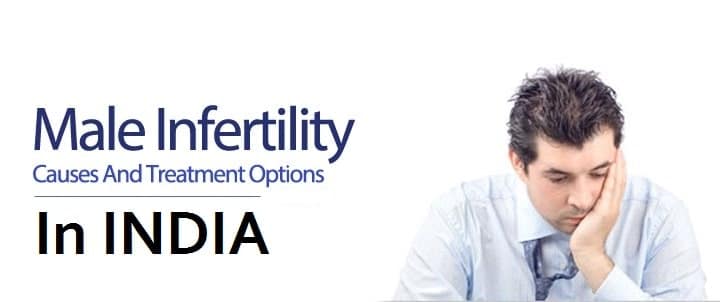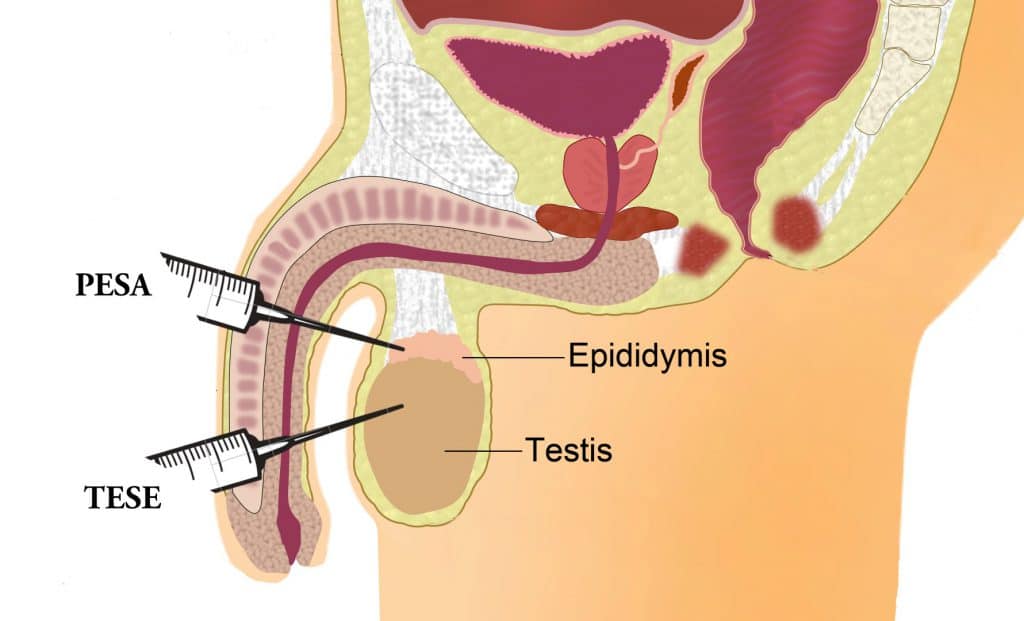What is infertility? Infertility can be defined as the failure to achieve pregnancy after regular unprotected sex (without the use of any contraception) for at least a year.
‘Primary’ infertility means failure to achieve a first pregnancy, ‘secondary’ infertility means failure to achieve a subsequent pregnancy.
Primary infertility is an extremely common problem, affecting more than one in seven (15 per cent) couples attempting their first pregnancy. Among those experiencing difficulty with conception, a male fertility problem is considered important in around 40 per cent of couples. In 15 per cent of couples it will be solely a male fertility problem and in around 25 per cent, there will be a problem in both partners.
Male infertility is by and large caused by the issues that have an effect on either sperm transport or sperm production. Through male fertility evaluation, the specialist may be able to come across the cause of the problem. Approx two-thirds of infertile males have the issue with sperm production in the testes; also several male fertility cases have been found of low sperm count, less sperm motility or morphologically unfit for fertilization.
Why do Men Get Fertility Problems?
There are several causes of fertility problems in men. They include:
- Obstructive problems (blockages in sperm-carrying tubes)
- Testicular injury and disease
- Varicocele
- Sperm disorders
- Genetic disorders
- Problem with erection and ejaculation
- Hormonal problems
- General medical disorders that reduce fertility
- Drugs that reduce fertility
- Environmental toxins and radiation
Obstructive Problems
A blockage in sperm-carrying tubes has many potential causes. The most common are outlined below.
- Groin surgery (including hernia repair and fixation of undescended testicles).
- Trauma to the scrotum sack covering the testicles (even fairly minor sporting injuries).
- Infection (particularly Chlamydia, gonorrhea and tuberculosis).
- Previous vasectomy (a form of contraception that involves tying the sperm-carrying tubes).
Some men have congenital (present at birth) absence of the vas deferens on one or both sides. The vas deferens is the tube that conducts the testicular component of semen to the urethra, which then carries semen through the penis to the outside world.
About 10 per cent of men with an obstructive cause for their infertility will have this problem. The seminal vesicles (where other semen components are made) are often absent too.
Another rare obstructive cause is Berry-Perkins-Young syndrome, in which sufferers have a chronic chest disease (bronchiectasis), chronic sinusitis and obstructive infertility.
Testicular Injury and Disease
A blow to the testicles, which may occur in sport or during a fight, can cause swelling of the testicles, or bleeding in or around them. This probably causes the blood supply to the testicles to fail, resulting in permanent damage to the sperm production mechanism.
Torsion of the testicles (twisting of a testicle on its cord) can have a similar effect if it is not treated very quickly with surgery. Viral infections can cause inflammation of the testicles (orchitis, which usually appears as painful swelling of the testicles) and failure of sperm production.
Mumps is the best-known cause, but is not the only one. Mumps will only affect fertility if it causes orchitis and, even then, only rarely. Undescended testicles (cryptorchidism) are another common cause of failure of sperm production. Male infants and children are routinely examined to identify this problem, as future fertility can only be preserved if surgical treatment to fix the testicles in the scrotum is performed in early childhood. Even surgery in infancy does not guarantee future fertility.
Varicocele
A varicocele is a dilation of the testicular veins in the spermatic cord that leads from the testicles to the abdomen. The role of this condition in causing infertility is uncertain and highly controversial. Varicoceles occur in 15-20 per cent of fertile men and 30 to 40 per cent of men with fertility problems. They can occur on either or both sides, but are far more common on the left.
They are best identified when the man is standing up and are often described as feeling like ‘a bag of worms’. Experts suggest that the varicocele either heats up the testicles or impairs their blood supply resulting in a build-up of body waste products, thus affecting fertility. The co-existence of other risk factors, such as smoking, with varicocele seems to have a greater effect on the risk of infertility.
Sperm Disorders
Disorders of sperm numbers, movement and shape are common in men with infertility. Prolonged abstinence from ejaculation can affect sperm motility. Modern techniques can identify structural and biochemical abnormalities within the individual sperm.
Genetic Disorders
Problems with chromosomes (packages of genetic material) occur in about 2 to 20 per cent of infertile men and can affect their fertility in two ways:
- Chromosome disorders can affect the development of the testicles. These are usually disorders of the sex chromosomes, by far the most common being Klinefelter’s syndrome. In this disorder, instead of having 46 chromosomes, including one X and one Y chromosome (46XY), the man has an additional X chromosome (47XXY).
- Chromosome abnormalities can disrupt cell division and sperm production.
Problems with Erection and Ejaculation
Problems with sex are the principal cause of infertility in about 5% of couples. This can be due to:
- erectile dysfunction (inability to attain or maintain an erection adequate for intercourse)
- premature ejaculation
- failure to ejaculate
- Inability to achieve vaginal penetration for other reasons.
Hormonal Problems
Testosterone deficiency can reduce fertility and may be caused by problems with testicular testosterone production, or problems with the pituitary gland or hypothalamus in the brain, which control testosterone production. Overproduction of prolactin (hyperprolactinaemia), a hormone produced by the pituitary gland, may also reduce fertility.
General Medical Disorders that Reduce Fertility
There are several conditions that may reduce fertility:
- Fever: influenza (flu), pneumonia, or even a severe cold can cause a high fever, which will adversely affect sperm production and quality. These changes usually recover over a few weeks.
- Diabetes: in the longer term, diabetes can cause problems with erection and ejaculation through causing damage to the function of the ‘automatic nervous system’.
- High blood pressure: hypertension (high blood pressure) can cause problems with erection, either directly or as a side effect of medication.
- Coronary artery disease: coronary artery disease can cause problems with erection. This could be due to generalized hardening of the arteries, in the penis as well as the heart, or to drugs used in the treatment of heart problems.
- Neurological disorders: multiple sclerosis, stroke, and spinal cord injury and disease can all cause problems with erection and ejaculation.
- Kidney disease: chronic renal failure, which results in a buildup of waste products in the body, can adversely affect sperm quality and fertility. It can also cause erection problems.
- Cancer: cancers that affect the genital tract or endocrine (hormone-producing) systems may directly reduce fertility. Otherwise, drugs and radiation used to treat cancer may severely reduce sperm production or even stop it altogether. Stress (see below) may also have an effect.
- Alcoholism: alcohol is toxic to sperm and overuse of alcohol can reduce sperm quality and fertility.
- Stress: stress causes several hormonal changes in the body that can affect fertility. Stress can have many causes, including anxiety over fertility problems.
Drugs that Reduce Fertility
Many drugs, both prescribed and those used recreationally can reduce fertility. Any fertility concerns related to prescribed drugs should be discussed with your GP – do not just stop taking them yourself.
| Recreational drugs that may affect fertility | |
| Recreational Drug | Effect |
| Alcohol | Reduces sperm count and quality |
| Tobacco | May reduce sperm motility |
| Marijuana | May affect hormone production |
| Opiates (heroin, morphine) | Affect hormone production |
| Anabolic steroids | Affect hormone production |
Environmental Toxins and Radiation
Several media reports have highlighted research studies showing that sperm counts are falling and that male fertility is declining, possibly because of environmental pollution. A similar number of studies have shown no change whatsoever, but these do not make such good headlines and often fail to be reported in the media.
Is male fertility in decline? Because evidence exists both one way and the other, the answer must be ‘maybe’! One thing is certain, and that is that many more environmental toxins that might affect fertility exist now than 50 years ago. The table below may be helpful for understanding male infertility and its treatment options.
| CAUSE | INVESTIGATION | TREATMENT OPTION |
| Failure of sperm production | Initial semen analysis Hormone assessments / Testicular biopsy |
Donor sperm Testicular sperm extraction and IVF / ICSI |
| Blocked/absent vas deferens |
Scrotal examination Screen for Cystic Fibrosis | Unblock microsurgically MESA with IVF / ICSI |
| Low sperm numbers | Semen analysis RCA | IUI, IVF or ICSI Poor sperm movement Semen analysis RCASperm stimulants with IUI / IVF or ICSI |
| High numbers of abnormal forms | Semen analysis RCA | IVF or ICSI |
| Antisperm antibodies |
Antisperm antibody screen | Sperm preparation with IUI, IVF or ICSI |
| Vasectomy | Vasectomy Reversal PESA / |
Male Infertility Treatment in Delhi, India
The main objective of male infertility treatment is to create pregnancy and have a baby. Some common and most preferred male fertility treatments are –
We Care IVF Surrogacy provides wide variety of male infertility treatment in Delhi, to conceive own child. Few treatments are as follow –
- IUI Treatment – One of the basic male infertility treatment to solve minor fertility issues
- IVF-ICSI
- IVF- PICSI
- IVF-ICSI with Surgical Sperm Retrieval (MESA, TESA, and PESA)
- IVF with donor sperm
- Surgery for male infertility
- Medication for infertility
ART techniques have been using extensively to treat male infertility issues. ART technique has offered much more advanced technology to deal with acute male fertility issues. One of the very common and preferred male infertility treatments is IVF with ICSI, where a single sperm is injected into the egg (retrieved) for a healthy and fast fertilization. ICSI is one of the advanced ART methodologies that provide a decent success rate to work on male infertility issues.
SSR or Surgical Sperm Retrieval is the surgical way to treat male infertility issue, where the fertility surgeon retrieves the sperm from the patient’s testes or epididymis. Under general anaesthesia, this surgery is accomplished by the team of We Care fertility veterans.
Infertility treatment deepens on the exact cause of the patient’s fertility case, and according to the fertility problem, suitable fertility treatment is performed.
At The Bottom –
At We Care IVF Surrogacy, the patients get the best care and matchless treatment with high success rate. Providing all the advance amenities, We Care IVF Surrogacy has come up with the leading fertility provider agency across India.
If you are facing with fertility issue (either male or female), you can contact our support team / or else you can fill the form, we promise we will come back with the best solution very soon.





